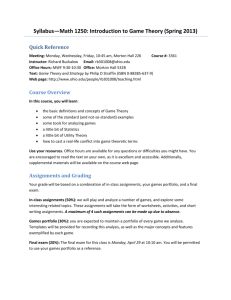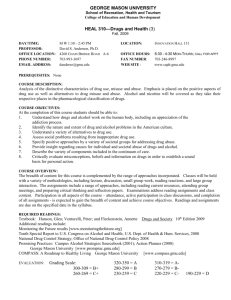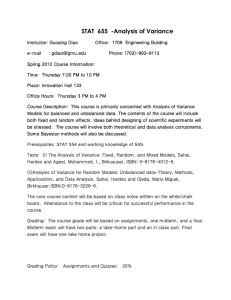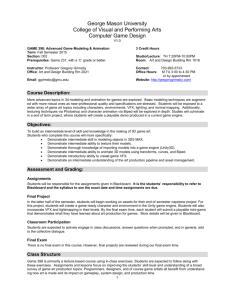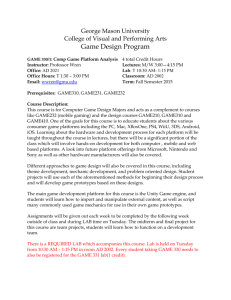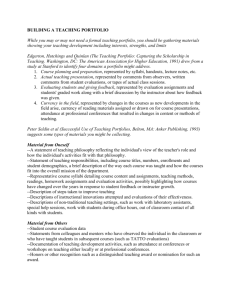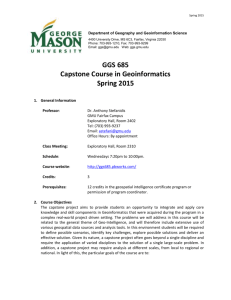Course Description - GMU Game Design
advertisement
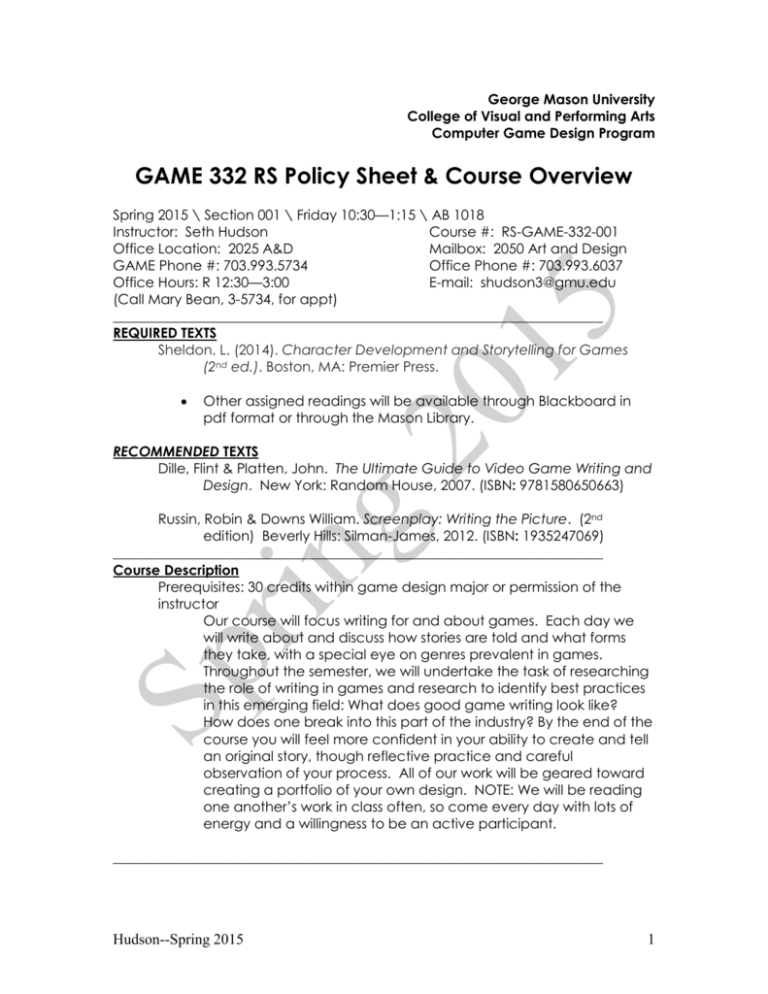
George Mason University College of Visual and Performing Arts Computer Game Design Program GAME 332 RS Policy Sheet & Course Overview Spring 2015 \ Section 001 \ Friday 10:30—1:15 \ AB 1018 Instructor: Seth Hudson Course #: RS-GAME-332-001 Office Location: 2025 A&D Mailbox: 2050 Art and Design GAME Phone #: 703.993.5734 Office Phone #: 703.993.6037 Office Hours: R 12:30—3:00 E-mail: shudson3@gmu.edu (Call Mary Bean, 3-5734, for appt) _______________________________________________________________________ REQUIRED TEXTS Sheldon, L. (2014). Character Development and Storytelling for Games (2nd ed.). Boston, MA: Premier Press. Other assigned readings will be available through Blackboard in pdf format or through the Mason Library. RECOMMENDED TEXTS Dille, Flint & Platten, John. The Ultimate Guide to Video Game Writing and Design. New York: Random House, 2007. (ISBN: 9781580650663) Russin, Robin & Downs William. Screenplay: Writing the Picture. (2nd edition) Beverly Hills: Silman-James, 2012. (ISBN: 1935247069) _______________________________________________________________________ Course Description Prerequisites: 30 credits within game design major or permission of the instructor Our course will focus writing for and about games. Each day we will write about and discuss how stories are told and what forms they take, with a special eye on genres prevalent in games. Throughout the semester, we will undertake the task of researching the role of writing in games and research to identify best practices in this emerging field: What does good game writing look like? How does one break into this part of the industry? By the end of the course you will feel more confident in your ability to create and tell an original story, though reflective practice and careful observation of your process. All of our work will be geared toward creating a portfolio of your own design. NOTE: We will be reading one another’s work in class often, so come every day with lots of energy and a willingness to be an active participant. _______________________________________________________________________ Hudson--Spring 2015 1 Writing Across the Curriculum GAME 332 RS, Story Design for Computer Games satisfies the Writing Intensive requirement for Computer Game Design undergraduate majors and is also part of the Film and Video Studies Screenwriting concentration (SCWR). Student will complete all of the following assignments, presented in portfolio (either digital or hard copy) in the final week of the course: 1) 250-word design philosophy/reflection 2) 500-word quest w/ box copy (see assignment for layout) 3) 1000-word game narrative review 4) The first 10 pages of a screenplay (2000-2500 words) a. NOTE: All assignments should be kept in an online environment (website) created by the student. This “portfolio” will be part of the final grade. b. Many assignments will be peer reviewed online in lieu of a full class meeting. c. All late work will receive a reduction in grade for each calendar day late. i. BACK EVERYTHING UP in the cloud/email and whatever hard media you choose. Ask yourself, “Could this possibly hurt?” Students will develop an understanding of the aesthetic and intellectual components of game narrative design through critical analysis of major historical game design works, creative work of their own, and conventions in Western literature and film. Each graded assignment will completed through a draft, feedback, and revision process, to provide each student the necessary advice, direction, and corrective instruction to advance his or her writing skills. This course is intended to give students knowledge and understanding of the art of game design through critical and/or historical analysis, theory, and practice. Game courses allow students to utilize varied methods for inquiry and satisfy academic curiosity through research and writing to establish a foundation for ongoing intellectual and creative development. _______________________________________________________________________ Statement on RS Designated Courses This class is designated as a Research and Scholarship Intensive Course, which means that students are given the opportunity to actively participate in the process of scholarship and will make a significant contribution to the creation of a disciplinary-appropriate product. Students will create original content for games while researching best practices for writing in the game industry and reflecting on their own creative process. Hudson--Spring 2015 2 RS Student Learning Outcomes As an RS course, the class includes the following student learning outcomes: Students who successfully complete GAME 332 RS will be able to… Create an original scholarly or creative project (Final Portfolio). Communicate knowledge from the portfolio project through online collaboration and feedback. Engage in scholarly inquiry by: o Articulating and refining a question: How do my experiences and knowledge related to writing in the genre of games? In light of current trends in the games market and popular culture, what is considered “good” writing for games? How do storytelling and collaborative writing enhance your design/creative abilities? o Applying appropriate conventions of the discipline: What does good game writing do and who is producing it? How is this work identified/recognized? What does this recognition indicate? o Situating the creative work within a broader context: What are the cultural implications of narrative in games today? To what extent do social constructs and current events affect content in games? _______________________________________________________________________ Grade Breakdown 10% 10% 10% 10% 10% 20% 20% 10% Class/Online Participation (reflected in two writing assignments) Reading responses Literature Review—Current Issues in Games 250-word Design Philosophy / Reflection (multiple revisions) 500-word Quest w/ Box Copy First 10 pages of original screenplay 1000-word game narrative review (GNR) Final Portfolio (Website or hard copy) Incorporating all assignments _____________________________________________________________________ POLICIES & INFORMATION Professionalism Many of the policies below relate to professionalism. Being courteous to the professor and other students is mandatory. All guidelines for Hudson--Spring 2015 3 assignments must be followed. If unsure about a policy, contact the professor immediately. This is the same for late work, absences, etc. Telling me after the fact looks bad. Be professional. All work should be cleanly edited: no (or extremely few) mistakes. Any questions you have regarding the use of the English language or other conventions should be researched thoroughly before taking them to the instructor—we will follow MLA format in the headings of assignments and with citation unless noted otherwise. Assumptions It is assumed that students have regular access to email and the Internet, so they will be able to receive updates and participate electronically when necessary. It is also assumed that students will diligently back up their work, rendering technical difficulties harmless. Failure to turn work in on time due to this type of issue will be treated like all other late work. When hard copies are required, they are required. Late Work Late work will only be accepted without penalty in the case of a documented medical illness or another situation that is out of your control. Late work will be reduced by a letter grade for each class period it is late. WHEN IN DOUBT notify the instructor if the situation is tenuous. Writing Center The Writing Center is available for writers of all levels. Tutors in the Writing Center (Robinson A114, Enterprise 076, Johnson Center 136) will talk with you about how you can improve your revision and editing strategies; they will not, however, edit or proofread your work—professionalism, once again. You can make an appointment online: http://writingcenter.gmu.edu/ Writing Assignments Due dates and revision guidelines will be clearly outlined at the outset of each assignment. Digital copies of assignments will be available on Bb. Some writing assignments will be assigned in class and completed in our time together, calculated into your grade via class participation. Class Participation Many of our sessions will operate like a traditional writing workshop. You will be expected to read others’ work aloud and give thoughtful input to aid their revision process. The best way to get a good mark for class participation is to participate meaningfully every day. Respecting each other’s opinions and work is crucial. Online Participation Blackboard (Bb) will be your friend in exchanging ideas and communicating with one another during the term, as will individual student websites. Student will be randomly assigned to Bb Groups. These groups will be responsible for peer review and weekly discussion periodically throughout Hudson--Spring 2015 4 the semester. The frequency and depth of online participation will factor into your grade. Email Policy Students must use their MasonLIVE or gmu.edu email accounts to receive important University information, including messages related to this class. See http://masonlive.gmu.edu for more information. Mason Emergency Information You may want to sign up for emergency alert messages. If so, go to https://alert.gmu.edu. You'll also find information about emergency procedures at http://www.gmu.edu/service/cert. Students With Disabilities If you are a student with a disability and you need academic accommodations, please see me and contact the Office for Disability Services (ODS) at 993-2474, http://ods.gmu.edu. All academic accommodations must be arranged through the ODS. Honor Code George Mason University has an Honor Code that requires all members of this community to maintain the highest standards of academic honesty and integrity. Cheating, plagiarism, lying, and stealing are all prohibited. All violations of the Honor Code will be reported to the Honor Committee. University Catalog Students are to be aware of the policies listed in the University Catalog: http://catalog.gmu.edu/. University dates concerning withdrawal are not negotiable by the professor. Other questions regarding university and program policies can be directed towards the Assistant Director outside of class time. _______________________________________________________________________ Thoughts: Please feel free to come talk to me about your work in general or this course specifically. I am here as your resource. For the purposes of this class, it is truly important that you think of yourself as a writer and a member of the design community in general; you are creating important, original work. Take pride in this fact, knowing that you’ve tried your best to fulfill every assignment. This mandate goes for all class meetings as well. As the semester progresses, each of you will develop a critical voice that will help shape the class and each other’s work. Embrace this responsibility. I look forward to getting to know you and enjoying your work. Hudson--Spring 2015 5

